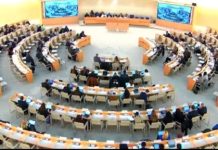By Yankuba Jallow
The PDOIS Militant Group organized a day long symposium on the topic sovereignty and national inclusion at the Samega Janneh Hall on Sunday, August 27, 2017.
The organisers did so with a view to sensitising the populace on who a sovereign citizen is and the powers that a sovereign person has in the republic.
PDOIS is a party established with a view that sovereignty is about ownership of power. In addition, PDOIS in their view believe that during the colonial period sovereignty or power did belong to a British monarch until The Gambia became a republic in 1970 when power or sovereignty was transferred to the Gambian people.
Speaking at the occasion, Honourable Halifa Sallah said as a sovereign citizen the Gambia belongs to all of us. He argued that each person has one vote to choose their representatives, which is a clear manifestation that every person is equal in the Republic of The Gambia.
“Our collective power is supreme,” he said.
He added that it is obvious that a person must have a say in determining what to do with what one owns.
“Each Gambian has the authority in determining how the country is to be managed,” he said.
He said a Gambian who recognizes his or her authority cannot accept to be under the domination of anybody on the face of the earth. He added that Gambia can only be in the hands of the people if each Gambian recognizes that he or she is equal to every other Gambian in particular and every other person in the world, saying it is only then that the Gambia’s status as a sovereign Republic will be a reality rather than a mere declaration.
“Each Gambian has a duty to know how best to manage the affairs of the country and what role to play to build the Gambia we all desire,” he said.
On the issue of tribalism, Sallah said no single Gambian or Family or Tribe can build roads, schools, hospital, markets and other services entirely on one’s own.
“These are social services, which require the contribution of all sections of society to be built,” he said.
He said as a sovereign citizen, tribalism has no place in the country since the sovereign citizens have the power to elect and remove leaders and representatives. He said in the year 2016, Gambians called for the political parties to come together in order to remove the former regime and that was done, President Jammeh was voted out of office through the ballot box. He added that this is a clear manifestation that sovereignty resides in the sovereign from whom the powers of the government can be derived. He said each family cannot build and operate farms, industries, import and export among many other services entirely on their own; that is the reason why tribalism has no space in the sovereign Republic of the Gambia and that is the reason for every Gambian who attains the age of 18 has the right to participate in the election of representatives.
The PDOIS Secretary General told the gathering that since all Gambians cannot meet every day to discuss what services to build and what laws to create, representatives are elected to collect monies from all in order to provide the services necessary and implement policies that would ensure liberty, dignity and prosperity in society.
On PDOIS’ Economic Policy, Hon. Sallah mentioned that a government has two types of budgets which are the recurrent and development budget. He said the recurrent budget is to provide for the day to day services such as providing medicine and personnel for hospitals and other essential services. The development budget is meant to build infrastructure such as roads and other projects.
In addition, Sallah said for there to be development, the productive base of the society must be built. He took as an example the fisheries sector, pointing out that the exportation of fish and its products is not the best way to help the Gambia develop. He added that there should be industries established so that the fish caught would be processed here in The Gambia and will generate employment as well as serve as a source of employment for many Gambians. He dilated on what the government can do in order to reduce the high burden of importation in many key areas such as feeding and also spoke on what the government can do in order to promote the welfare of farmers. On his way forward, Sallah spoke on how the high unemployment rate in the country can be reduced and help eradicate the poverty of the people by empowering them in all sectors.
In conclusion, Sallah said a sovereign citizen must know the status and power of a sovereign citizen is in order to participate immensely in national development. He tasked all the people to ponder on the topic whether they are sovereign citizens and if the answer is in the affirmative then one should ponder on what policies can salvage the country.
Hon. Suwaibou Touray, the PDOIS member for Wuli East said sovereignty resides in the people from whom the government derives its power. He added that a sovereign person observes the laws of the country and also participates immensely in national development.
“A sovereign citizen puts the national interest first before any other interest,” he said.
He added that The Gambia belongs to all of citizens and therefore it is a duty for every person to know their sovereignty status by knowing the power bestowed on a sovereign citizen. He said the power of the citizenry is greater than each citizen has to know in order to contribute greatly to national development.
Honourable Ousman Sillah, PDOIS National Assembly Member for Banjul North said it was on April 24, 1970 when Gambian Republican status was attained, which means the country shall never be subjected to any other control. He added that on that day no tribe was mentioned to determine how the country should be managed adding that tribalism has no space in the Gambia.
“In the country’s politics tribalism has no place” he emphasised.
He further stated that the Constitution, which is the supreme law of the country does not mention any tribe to determine who is to manage the country but mentioned the people of the country. He said election is a process of entrusting power to representatives and they are subjected to transparency and accountability to those who have elected them. He added that the people have power to entrust representatives whose primary responsibility would be promoting their welfare and they ought not to be considered rulers or kings but trustees.
Lawyer Assan Martin in his deliberation on Democracy and Republican values said those two connotations mean power belongs to the people and that is the reason why people elect representatives to represent them and look after their affairs.
“A republican state means the power of the people” he said.
He argued that democracy goes beyond the observation of people’s rights to include the people’s rule.
“The people have a say in the way their affairs are run,” he said.


















